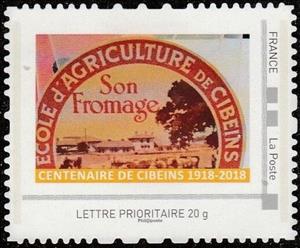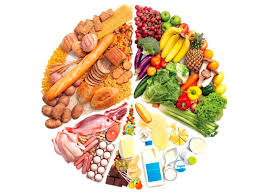Stamp: Cibeins Agriculture School Cheese Centenary 1918 2018 (France 2018)
Cibeins Agriculture School Cheese Centenary 1918 2018 (France 2018)
01 January (France ) within release Collector : Cibeins Centenary goes into circulation Stamp Cibeins Agriculture School Cheese Centenary 1918 2018 face value Prioritaire No Face Value
| Stamp Cibeins Agriculture School Cheese Centenary 1918 2018 in catalogues | |
|---|---|
| Colnect codes: | Col: FR-MON 2018-166 |
Stamp is square format.
Also in the issue Collector : Cibeins Centenary:
- Stamp - Cibeins Centenary 1918-2018 Horse face value Prioritaire;
- Stamp - Cibeins Agriculture School Cheese Centenary 1918 2018 face value Prioritaire;
- Stamp - Cibeins Centenary CAM Credit Agricole Mutuel face value Prioritaire;
Stamp Cibeins Agriculture School Cheese Centenary 1918 2018 it reflects the thematic directions:
Agriculture is the cultivation and breeding of animals, plants and fungi for food, fiber, biofuel, medicinal plants and other products used to sustain and enhance human life.[1] Agriculture was the key development in the rise of sedentary human civilization, whereby farming of domesticated species created food surpluses that nurtured the development of civilization. The study of agriculture is known as agricultural science. The history of agriculture dates back thousands of years, and its development has been driven and defined by greatly different climates, cultures, and technologies. Industrial agriculture based on large-scale monoculture farming has become the dominant agricultural methodology.
An anniversary is the date on which an event took place or an institution was founded in a previous year, and may also refer to the commemoration or celebration of that event. For example, the first event is the initial occurrence or, if planned, the inaugural of the event. One year later would be the first anniversary of that event. The word was first used for Catholic feasts to commemorate saints. Most countries celebrate national anniversaries, typically called national days. These could be the date of independence of the nation or the adoption of a new constitution or form of government. The important dates in a sitting monarch's reign may also be commemorated, an event often referred to as a "Jubilee".
Food is any substance consumed by an organism for nutritional support. Food is usually of plant, animal, or fungal origin and contains essential nutrients such as carbohydrates, fats, proteins, vitamins, or minerals. The substance is ingested by an organism and assimilated by the organism's cells to provide energy, maintain life, or stimulate growth. Different species of animals have different feeding behaviours that satisfy the needs of their metabolisms and have evolved to fill a specific ecological niche within specific geographical contexts.



